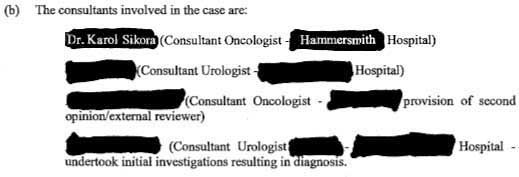last edits 14 Sept
I just stumbled onto a New York Daily News article from a month back titled "Lockerbie bomber Abdelbaset al-Megrahi's cancer doc: I would've been more vague on terrorist's fate." This in reference to a Dr. Karol Sikora, who is widely perceived as the or a doctor whose advice to the Scottish government was paid for by Libya and freed Megrahi a year ago.
A cancer doctor who predicted Lockerbie bomber Abdelbaset al-Megrahi had just three months to live now thinks he should have hedged his bets. [...] "If I could go back in time, I would have probably been more vague and tried to emphasize the statistical chances and not hard fact," Dr.Karol Sikora, one of several experts who examined Megrahi, told Britain's Observer newspaper.
This has been repeated by many, many others before and after that and widely taken as fact - a characterization Sikora himself did nothing to discourage. A later article of 1 September in the Charleston, SC Post and Courier said "according to a Scottish doctor paid by Libya, he had only months to live. [... MacAskill later] released al-Megrahi, citing the doctor's opinion."
No one can know what really happens in the shadows, but there's no reason to believe Sikora was actually relevant to the decision made. The image of such is like cotton candy - a little sugar, no nourishment, some color, hot air, and abundant spin.
No one can know what really happens in the shadows, but there's no reason to believe Sikora was actually relevant to the decision made. The image of such is like cotton candy - a little sugar, no nourishment, some color, hot air, and abundant spin.
The Illusion
Dr. Sikora (pictured at left posing with a large book) has a colorful history in medical consultancy. He's apparently something of a hired gun, or acts like one, and has worked with an American political campaign to counter the move towards "socialized medicine." He was first mentioned in connection with the Megrahi case by Herald Scotland, 20 August 2009, just hours before MacAskill's announcement. After speaking with him, Lucy Adams reported (incorrectly as it turns out):
"...the assessment given by Professor Karol Sikora goes some way to explain why the Justice Secretary may have reached the decision he has.
Dr Sikora, who visited Megrahi in prison, had called for an "urgent" decision on the future of the Lockerbie bombing prisoner before his condition worsens further. "We believe he has only a very short period of time to live," said Dr Sikora, who assessed Megrahi last month."Around 6 September, a few weeks after the release, the Sunday Telegraph reported that the Libyans had paid for the medical advice of three doctors including Sikora and "encouraged" them to form the opinion that Abdelbaset Ali Mohmed Al Megrahi had just three months to live. ( The Daily Mail) Coincidentally, at least one of them quite vocally did.
Seven months later in April, as all other involved doctors remained fairly quiet, Sikora said the clues suggested Megrahi "will be dead within four weeks." (Times) Twelve weeks later, on July 4, he gave an interview with the UK Sunday Times (unavailable online, but re-quoted by the Daily Mail and many others). Sikora found it "embarrassing" his irrelevant three-month call was so wrong. He acknowledged that he was aware of what the prognosis meant,:
"It was clear that three months was what they [the Libyans] were aiming for. Three months was the critical point. On the balance of probabilities, I felt I could sort of justify (that). [...] There was a 50 per cent chance that he would die in three months, but there was also a 50 per cent chance that he would live longer."Scottish Denials
Sikora did in fact receive money from Libya and tried to lobby Kenny MacAskill - but the justice secretary had already decided based on another prognosis by proper authorities with no such (known) conflict of interest.
There was a summary of medical reports that was publicly available, but it did little to clear up the issue, with all the names of all relevant consultants redacted. Sikora either fits or comes darn close for the first listed oncologist. (this only fits with Hammersmith hospital, where he served 12 years as clinical director of cancer research - source - but he seems to have moved onto other things before August 2009)
But as pointed out to me, this would be a rather stupid and unwarranted thing to do, including Libya's consultant in the official decision. They specifically denied this shortly after the release last year. In the Daily Mail's 6 September article about the suspect three, they included this response from the Scottish government:
The Director of Health and Care at the Scottish Prison Service drew on expert advice from a number of cancer specialists in coming to his clinical assessment that a three month prognosis is now a reasonable estimate for the patient.
These included two consultant oncologists, two consultant urologists and a number of other specialists, including a palliative care team, who had reviewed and contributed to the clinical management of the patient.
They did not include Karol Sikora, Jonathan Waxman or Ibrahim Sherif, whose assessments played no part in considerations – including no part in the report submitted by the Scottish Prison Service Director of Health and Care.
I had originally been taken by the confusion as well, and called Sikora the responsible doctor. But with prompting from "Jo G," I corrected that to "unnamed doctor" on 7 August (see comments here). As the articles we started with shows, some journalists are still behind in coming to their senses here. A conscious media campaign could hardly have done a better job of helping create the illusion (which does persist here heavily) that Scotland under the dread SNP freed the bomber based on Libya's paid prognosis.
The Actual Relevant Doctor
Before the health director, Dr. Andrew Fraser made his decision to call three months reasonable, he read one opinion to that effect from an unnamed "primary care physician" of al-Megrahi's. He examined Megrahi on 26 July 2009 and again on 3 August. The deterioration he perceived between the two is what led him to state "the clinical assessment, therefore, is that a 3 month prognosis is now a reasonable estimate for this patient." [PDF source]
Peter Kay rather is the name, rudely announced 15 August, the day before the NYDN article we started with. the UK Express reported on the actual doctor who made the crucial call.
Dr Peter Kay can now be named as the primary care doctor at Greenock Prison from the time Abdelbaset Ali Mohmed al-Megrahi’s prostate cancer was discovered in autumn 2008 to his release one year ago this week.
And while official records – published in the aftermath of the decision to send Megrahi home – revealed four specialists were unwilling to say how long the bomber had left to live, it was a prognosis by Dr Kay that his condition had “declined significantly” that led to his eventual release.
Interestingly, the article manages to raise questions even about this doctor, who was found to be shy of attention:
Sikora's Actual InvolvementAllegations have also surfaced the relatively inexperienced GP, believed to be in his late 30s, may even have been put under pressure by Megrahi and the Libyan authorities after he initially described the symptoms as “minor”.I've seen anonymous US family member "Bunntamas" suggest just this, but that person has a vivid imagination and littlegrasp of the facts. But that's another issue - this post is about chatterbox Sikora.
As our oncologist explained to the Daily Mail "I got invited (by the Libyan government) because I had been to Tripoli a few times." Once on the job:
"At first sight I thought it was more likely that his life expectancy was six to 18 months. But we went up there and saw him, and looked at everything, talked with the prison doctor. After that, I thought it would be three months, and I stand by that."Sikora's last look at the prisoner was on July 28, meeting prison doctor (presumably Dr. Kay) two days after Kay's most recent check. Sikora came along with Ibrahim Sheriff from the Tripoli medical centre, and Dr Abdulrahman Swessi (or Abdullah Swissi), Libya's consul-general in Scotland. (Herald Scotland) Sikora's report, specifying three months, was apparently lodged soon thereafter, but as the Daily Mail reported:
"The Scottish government claimed the advice arrived too late to be considered by Justice Secretary Kenny MacAskill, but Professor Sikora said he doubted this. 'We submitted our report three weeks before his return so I think there was plenty of time to consider it.'"That would be somewhere around the beginning of August - just about when Dr. Kay himself decided three months on the 3rd. It seems the timing wasn't so much the issue as the source, but this first or second opinion, depending, was officially irrelevant.
Conclusion
From all the above, a clear pattern has emerged of a Libya-tainted man whose thoughts paralleled a separate decision, and has attached himself to the case, dug in like a tick. He's persistently taken every chance to re-affirm the illusion of his relevance to the media, and occasionally has added other fuel to the fire along the way. As he says, his report was submitted in time, and so he may genuinely believe he's involved. But the effect is not the intent is hugely dishonest.
In his 4 July statement Sikora, trying to explain the uncertainties of diagnosing cancer, unfortunately stated:
This was widely and predictably taken by the American media to say the ten or 20 year "prognosis" was more real than the "sort of justified" three month one. That a doctor they believed responsible so "erred," pleasing his Libyan customers, enraged the empty-headed poseurs in the U.S. Senate. Armed with Sikora's nonsense plus a revived, post-spill reminder of the BP angle, within days Senators Lautenberg, Schumer, Menendez, and Gillibrand were urging an inquisition into the black magic that freed Megrahi. Within days of that, Sikora stated with annoyance that his recent talk of decades was taken out of context, but it fell on deaf ears as the Senate Foreign Relations Committee set to requesting audiences."There was always a chance he could live for ten years, 20 years ... But it's very unusual."
Again on 14 August NYDN repeated as relevant that Sikora "added that the released terrorist could even survive another 10 years." And he speaks of time travel that would give him today's knowledge then, in which case he "would have probably been more vague." It was less than comforting, especially given that his decision still didn't matter. "Some families of the victims," who fail to grasp this, "were livid over Sikora's musings," NYDN reported.
"This is an added kick in the face and another example of them throwing rocks in the face of the families," said Susan Cohen of Cape May Court House, N.J., who lost a daughter, Theodora, 20, in the attack.The effect of this behavior, which Mrs. Cohen senses most acutely in the face, is keeping the American victims and public nice and angry, feeding into confusing misinformation and pressure for the proposed Senate investigation into the release. This is ultimately a probe into the imaginary conspiracy theory that has arisen to explain the "terrorist's unjust release." Again, as usual, Sikora's antics are convenient for someone, but not for the purpose of calmly establishing truth.




No comments:
Post a Comment